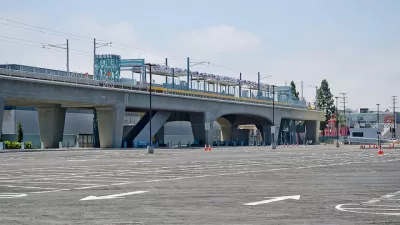Lots of planning is discretionary. Cities and developers negotiate what builders will do for cities in exchange for the right to build, creating an incentive for bad rules, eroding the public's faith in zoning, and enabling political corruption.

In 2015, an unusual Los Angeles development controversy came to a head. A neighborhood association in Hollywood had sued the developer of a newly completed 22-story, 300-unit apartment building. By Hollywood's standard zoning, a building like this one wasn't allowed. It was taller than the neighborhood’s height limits, and—importantly—didn't have as much parking as the city usually required. It had been built nevertheless, because the developer had signed an agreement with the city that exempted the building from some regulations if the developer met a few additional conditions—namely, the city said the developer could provide fewer parking spaces if the developer preserved the façade of a Spaghetti Factory restaurant previously occupying on the site. (The Spaghetti Factory was considered a historic resource.)
The conflict arose because—according to the developer—the Spaghetti Factory turned out to be too dilapidated to save. With the city's permission, the developer demolished it and rebuilt the façade; given the circumstances, the developer said, it had fulfilled its agreement with the city. The neighborhood association disagreed, argued that the façade had been improperly demolished, and the agreement had been violated. A judge sided with the association and declared the agreement null. Once the agreement was null, the project itself was out of compliance, because (among other things) it didn't have enough parking.
There's plenty that's odd about this story, including the idea of a "historic" Spaghetti Factory. But let's focus on the curious role played by the parking requirement. By the logic of the development agreement, and thus of the lawsuit, a building without a Spaghetti Factory façade needed 300 parking spaces. The same building, on the same site, but with the façade, did not. That makes no sense. The presence or absence of a façade shouldn't change how many people drive to a building. Whatever the parking requirement was doing, it didn't have much to do with parking.
The parking requirement, in short, was pretextual: Its value to the city lay not in stated intentions of the zoning code (i.e., ensuring the presence of parking spaces), but in what developers would do to escape it. The city used the parking requirement as an indirect way to preserve historic character, not a direct way to guarantee vehicle storage. It might have been on the books as a transportation mitigation; its real purpose was as a bargaining chip.
Planning is full of such pretext. That probably isn't good for planning.
Discretion: the Mother of Pretext
Zoom back out to when this Hollywood tower was first proposed. Los Angeles had determined, years before, that it wanted Hollywood, a central area with three subway stations, to have more density. Given that fact, it's notable that the developer needed special permission to build a 22-story building. If density is the goal, why not just allow it?
The answer is that a lot of city power, especially in land use regulation, comes from discretion: the ability to selectively release some developers from some rules in exchange for community benefits like open space or affordable housing. In cities where housing demand is strong, discretion can let cities finance public services through the zoning code, and deliver those services without raising taxes.
Discretion has always been a part of planning, for the simple reason that planning rules can rarely be inviolate. Sometimes, for example, an applicant has an oddly shaped parcel or other unusual condition would need a variance even to build something simple, and consistent with the local zoning. Beginning in the 1980s, however, discretion expanded, and took on a more strategic character as a result of two factors: property tax restrictions and rising concerns about environmental quality and historic preservation. The first limited the ability of local governments to finance services through taxation. The second gave cities new regulatory power over development. In combination, cities lost fiscal autonomy but gained land use power.
Since residents still wanted services, cities started using the latter to compensate for the former, by negotiating more with developers. Want fewer parking spaces? Finance some affordable housing and we'll roll back the requirements. Want to build an extra story? Build a park and we'll relax the height limit. In California, discretion eventually became central to the state's affordable housing program. Developers can get more density and provide less parking if they contribute subsidized units.
Discretion is the mother of pretext. When cities use rules to bargain with developers, the rules quietly take on a different role. Discretionary bargaining requires both stringent regulations and a willingness to waive them, which means that in a discretionary regime, the optimal zoning code will have rules that are both onerous and (at least some of the time) unnecessary. The rules need to be onerous to get developers to the table, and unnecessary so they can be traded away at little cost.
Here, a problem arises: A zoning bylaw that contains onerous and unnecessary regulations might be good for bargaining, but it isn't a good zoning bylaw. It's no accident that parking requirements show up a lot in discretionary rulemaking. They're harmful. Almost no one believes parking requirements aren't onerous, that they have positive social value, or that cities would be worse off without them. In a world where we wanted good zoning, parking requirements look awful. But in a world where we want to use zoning to negotiate for good outcomes, parking requirements look valuable. That's one reason the California APA, as well as some affordable housing advocates, are reluctant to embrace statewide parking reform. The APA, crucially, makes no argument in favor of parking requirements. It argues only that requirements offer valuable leverage in getting developers to build affordable housing—a goal wholly unrelated to storing vehicles. That's pretext.
Pretext at the Expense of Certainty
But is pretext really so bad? One case for discretion (and pretext) is that it makes zoning more powerful, converting it from a tool that merely regulates land into a vehicle for accomplishing other goals. But discretion also deprives zoning of power, by shifting influence away from the rules themselves and toward people with the authority to change them.
That shift of influence has two consequences. First, it erodes the certainty and transparency that zoning nominally thrives on. Zoning is supposed to be a community property right, and property, as Jeremy Bentham famously said, is “nothing but a basis of expectation.” Those expectations become less reliable when the purpose of the zoning-as-written is unclear. Does a density restriction mean a community wants low density, or does it actually mean the community wants some unstated package of other improvements and will trade density to get it? No one knows until someone pulls a building permit. Selectively enforcing rules can give officials more power to accomplish short-term goals, but it risks a long-term consequence of eroding faith in the rules themselves.
Second, shifting power away from rules and toward people invites corruption. The discretionary trade in development rights, even when it is wholly legal, strikes many people as unseemly. But empowering a small group of people to offer exemptions can turn unseemly trades into illegal ones. The scandal that engulfed the Los Angeles City Council's Planning and Land Use Management (PLUM) committee in 2018 was rooted in the PLUM's discretionary power. L.A.'s zoning code is hopelessly outdated; little can be built without discretionary approvals. In a hot housing market, developers wanted extra height and more density, and some of them bribed at least one councilmember to get it. Corruption scandals, of course, also do professional planning no favors.
Zoning should be transparent. If Los Angeles wants density in its downtown and in Hollywood, it should zone for that density—not zone itself halfway there and then let the bargaining begin. Similarly, if the California APA wants to withhold its endorsement of parking reform, it should do so because it believes California has a parking shortage, not because it believes (wrongly, in my view) that cities can trade parking requirements for subsidized housing. Even if bad policies sometimes yield good outcomes, our goal should be good policies that yield good outcomes. Affordable housing, open space, and preservation are all important. For precisely that reason, we can and should build an affirmative case for them. We don't need to smuggle them into the city through our zoning regulations and risk debasing those regulations in the process.
[Note: Portions of this column are adapted from an academic article “Motivations for Growth Revolts” published in the journal City and Community.]
Michael Manville is an associate professor of Urban Planning at the University of California, Los Angeles, who studies housing, land use, and transportation.

Depopulation Patterns Get Weird
A recent ranking of “declining” cities heavily features some of the most expensive cities in the country — including New York City and a half-dozen in the San Francisco Bay Area.

California Exodus: Population Drops Below 39 Million
Never mind the 40 million that demographers predicted the Golden State would reach by 2018. The state's population dipped below 39 million to 38.965 million last July, according to Census data released in March, the lowest since 2015.

Chicago to Turn High-Rise Offices into Housing
Four commercial buildings in the Chicago Loop have been approved for redevelopment into housing in a bid to revitalize the city’s downtown post-pandemic.

Google Maps Introduces New Transit, EV Features
It will now be easier to find electric car charging stations and transit options.

Ohio Lawmakers Propose Incentivizing Housing Production
A proposed bill would take a carrot approach to stimulating housing production through a grant program that would reward cities that implement pro-housing policies.

Chicago Awarded $2M Reconnecting Communities Grant
Community advocates say the city’s plan may not do enough to reverse the negative impacts of a major expressway.
City of Costa Mesa
Licking County
Barrett Planning Group LLC
HUD's Office of Policy Development and Research
Mpact Transit + Community
HUD's Office of Policy Development and Research
City of Universal City TX
ULI Northwest Arkansas
Town of Zionsville
Write for Planetizen
Urban Design for Planners 1: Software Tools
This six-course series explores essential urban design concepts using open source software and equips planners with the tools they need to participate fully in the urban design process.
Planning for Universal Design
Learn the tools for implementing Universal Design in planning regulations.


























